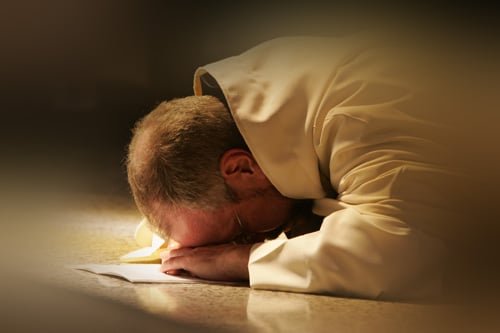October 24, 2010
Luke 18:9-14
Carl Jung, the famous psychologist, was a man of faith. One day he asked his Rabbi, “Why is it that in biblical times God appeared to many people and many people saw him, but today hardly anyone sees God?” The Rabbi thought for awhile and then said “I think it’s because today there is not anyone around who can bow down low enough.” Bowing down low is not a modern virtue. We dedicate ourselves to improving ourselves, to lifting ourselves, to encouraging a positive self-esteem. There is nothing wrong with feeling good about ourselves and about our achievements. But when it comes to our relationship to God, another stance is demanded. God is greater than us. So the only way we can come into God’s presence is by knowing our radical dependence on God’s mercy. Yes, we are good and worthwhile people, but in the presence of God, we must humble ourselves. We must bow down low so that a relationship with God can be formed.
This is what the tax collector does well in today’s Gospel. Standing apart, he does not lift his eyes to heaven, but simply prays for God’s mercy. Jesus says that his prayer is answered, and he goes home justified. But the same is not true of the Pharisee. Now the Pharisee, to be sure, was a good person—a very good person. His fasting and his tithing are all good works. But what the Pharisee does not understand is that none of these achievements can be the basis of a relationship with God. In order to be related to God, he must take the same stance as every other person including that of the tax collector. He must understand his radical dependence on God’s mercy. Knowing this truth is important for each one of us, because it is the only way that we can have our correct relationship with God. It also prepares us for what is to come.
Basil Hume was the Cardinal Archbishop of Westminster England. In 1999 he was diagnosed with terminal cancer. Upon this news, he told his friend, Tom Crawley, “The first thing I thought when I realized that I had the cancer was that I wished for another chance—a chance to start over. I knew that if I had more time, I could be so much better a man, a monk, a bishop. But then I thought that when I die it would be a great advantage to come before God with nothing. Instead of being able to say, ‘Thank you God for making me such a good man, such a good monk, such a good bishop,’ it would be so much better that I could simply say, ‘God, be merciful to me, a sinner.’ If I came to God empty handed, I then would be ready to receive what God would give.” The stance, then, of a disciple is not to come before the Lord with all of our blessings and achievements but rather to bow down before God and to be empty enough to let mercy in. This is why we must begin to cultivate in our lives an attitude of humility.
Now it’s certainly right and just that we should be thankful for our health and for our energy– to be grateful that we can run and swim and play ball. These are all that come from God. But one day it is likely that we will find ourselves in a situation where our health is faded, where our joints no longer bend. In that moment, the important thing is that we will be able to open ourselves to receive God’s love. So even today, as we have our energy and our health, it is important to carry these gifts with humility realizing that they are ultimately not the most important thing.
It is right and just that we take pride in our talents and abilities—in our ability to work, to earn a living by speaking, selling, closing a case, or designing a project. All of these things are blessings from God. But a day will most likely come when our breath becomes shallow and our mind a little feeble. On that day, the only important thing for us to say is “God have mercy on me, a sinner.” So even today, as we use our talents and abilities, it is important to carry them with humility because they will not always be with us.
It is right for each one of us to be thankful—thankful for our possessions, for our talents, for our relationships, for our achievements—but it is also important to remember that a day will come when none of them will matter. This is why we should begin today to cultivate the habit of humility, to recognize today our complete dependence on God. In the end, that is the only thing that matters. “Those who exalt themselves will be humbled, but those who humble themselves will be exalted.”

